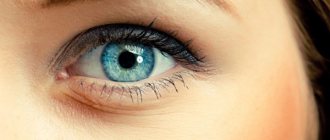Causes
There are the most common reasons why the quality of vision deteriorates. Patients can view them before going to the doctor to have an idea about the diseases. But to make a diagnosis, a medical diagnosis is necessary.
Physiological
There are physiological reasons for temporary deterioration in the quality of vision. Their peculiarity is that they go away over time and do not require treatment:
- A temporary decrease in blood sugar that is not associated with diabetes. The reason in this case is a reduced intake of food into the body or starvation. The brain sends a signal that it needs glucose to function.
- A temporary increase in blood sugar not associated with diabetes. An increased amount of carbohydrates affects the brain, disrupting its function for a time.
- Changes in blood pressure associated with changes in weather. A person experiences loss of strength, dizziness, and blurred vision.
- Severe stress. Prolonged nervous tension causes the release of hormones into the blood and an increase in blood pressure. These factors affect the eye tissue and brain, causing blurred vision for a while.
- Senile changes in the internal structure of the eyes, which lead to the natural aging process and deterioration in the quality of vision.
If blurred vision occurs more than once in the presence of physiological factors, it is recommended to consult a doctor. It is possible to prescribe medications that will prevent this condition.
Disease related
There is a list of diseases in which visual function is most often impaired:
- damage to the vitreous body, which is caused by exposure to physical or chemical factors, as a result of which the eye loses the clarity of perception of the picture, which becomes foggy and blurry;
- clouding of the lens up to cataracts;
- formation of farsightedness and myopia;
- diseases associated with disorders of the retina, including retinal detachment;
- diseases that disrupt normal blood flow in the microcirculation vessels of the eyes (atherosclerosis, coronary artery disease, diabetic retinopathy);
- bacterial or viral conjunctivitis, causing excessive accumulation of secretions on the surface of the eyes;
- inflammatory condition of the cornea;
- entry of a foreign body under the eyelids;
- a benign or malignant tumor, which with its edges compresses the center of vision.
If any pathological condition is detected that impairs the functionality of the eyeball, treatment must begin. It can be conservative or surgical. The variety is selected by the doctor individually for each patient.
Causes of blurred vision and visual impairment
- Deterioration of vision due to fatigue:
- Constant fatigue and visual tension;
- Frequent stress;
- Chronic lack of sleep.
- Retinal diseases:
- Retinal disinsertion;
- Macular degeneration;
- Vitreous detachment and retinal tears;
- Diabetic retinopathy.
- Lens diseases:
- Cataracata;
- Myopia;
- Farsightedness.
- Eye injuries:
- Foreign body;
- Eye burn;
- Bruised eyeball;
- Retinal hemorrhage;
- Bleeding in the orbit;
- Eye injury;
- Diseases of the cornea accompanied by deterioration of vision:
- Corneal thorn;
- Keratitis;
- Corneal ulcer;
- Endocrine system diseases:
- Pituitary adenoma;
- Diseases of the thyroid gland;
- Other sores causing decreased vision:
- Brain cancer;
- Glaucoma;
- Migraine;
- Optic neuritis;
- Transient ischemic attack;
- Presbyopia;
- Convergence insufficiency;
- Temporal arteritis;
- Scleritis.
Diagnostics
After the patient contacts the doctor, a set of diagnostic measures is carried out. To make an accurate diagnosis, several techniques must be used:
- Anamnesis collection. This is data obtained from the words of the patient or his close relatives. Based on them, the doctor can assume some kind of disorder and prescribe additional diagnostic methods.
- General inspection. The external condition of the visual organs is assessed. The doctor determines the quality of the skin and mucous membranes, the presence of redness or discharge. As visual acuity decreases, the patient may periodically squint.
- Determination of blood and intraocular pressure levels.
- Assessment of visual acuity using diagnostic tables. They depict symbols, letters, pictures. The choice depends on the patient’s age and degree of mental development. The doctor estimates how many rows in the table the patient sees. Based on these findings, it may suggest myopia or astigmatism.
- Checking the quality of vision for each eye separately using a refractometer.
- Checking the condition of the fundus. To do this, a solution is first dripped onto the mucous membrane of the eyes, which temporarily disrupts the accommodation of the pupil. The doctor assesses the condition of the lens, vitreous body, eye chambers, retina, and microcirculation vessels.
- MRI, . Using techniques, you can evaluate not only the structure of the eyeball and surrounding tissues, but also the brain. The screen shows inflammatory processes in nerve tissues, the quality of blood vessels, the presence of a tumor or hemorrhage.
- Lab tests. These include general blood and urine analysis, blood biochemistry. Using the data, changes in sugar levels and other indicators that can lead to a deterioration in the patient's condition will be visible.
Only on the basis of diagnostic tests can a doctor make a reliable diagnosis. If a disease or physiological factor is identified, treatment can begin.
Neurological diseases
The mechanism of vision is carried out with the help of certain nerve fibers included in the autonomic nervous system, and is controlled and regulated by neurons of the brain centers belonging to the central nervous system. Disturbances in the functioning of the central nervous system and peripheral system can affect visual acuity and the ability to see in general. Disruption of cerebral blood supply due to ischemia, stroke, aneurysm, atherosclerosis leads to clouding of the eyes.
Thus, blurred vision may be a symptom of:
- poisoning;
- traumatic brain injury;
- vegetative-vascular dystonia;
- cerebral atherosclerosis;
- aneurysms;
- hypertensive crisis;
- diabetes mellitus
Also, the reason that the image in the eyes has become cloudy and blurry can be a deficiency of vitamins, especially vitamin A (necessary for nourishing the tissues of the eye) and group B (necessary for the normal functioning and good conductivity of nerve fibers, including the eye), lack of nutrients substances.
Blurred vision sometimes indicates the onset of a dangerous disease such as multiple sclerosis. This symptom appears earlier than others and indicates damage to the nerve fibers of the eye. The patient experiences changes in visual acuity throughout the day and limited visual field.
Blurred vision and loss of consciousness can be caused by prolonged fasting or an overly strict diet. In this state, the body experiences a severe deficiency of nutrients, glucose and vitamins. This leads to the fact that the energy resource of the central nervous system is greatly limited, and vision decreases. The longer this condition lasts, the more dangerous the processes occurring in the body that lead to visual impairment.
Long-term starvation, vitamin deficiency and nutritional deficiency lead to the fact that degenerative processes become irreversible.
What to do
If a pathological factor is determined, that is, the presence of any disease, treatment is carried out. It depends on the reason that caused the blurred vision. The most common treatment methods include:
- antihypertensive drugs that lower blood pressure;
- glasses or lenses to correct myopia and farsightedness;
- insulin-based diabetes therapy;
- conservative treatment for the internal structures of the eyes (drops that reduce intraocular pressure, eliminate clouding of the lens);
- a diet aimed at reducing the amount of cholesterol to eliminate atherosclerosis;
- eye gymnastics, which is carried out to relieve eye fatigue during prolonged work at the computer;
- food, which contains many vitamins, nutrients, microelements, minerals necessary to enhance metabolism in eye tissues.
A diet combined with the use of medications can eliminate minor disorders in the human body. If they are extensive, surgical intervention is necessary. The doctor can remove the tumor, replace the lens with an artificial model, and repair damage to the retina.
Treatment of blurred vision, visual impairment
First of all, treatment is aimed at eliminating the cause that leads to decreased vision. Laser correction can be performed. If the treatment is successful, ophthalmologists prescribe a set of restorative procedures and recommend the following:
- Do not sit close to the monitor, work in comfortable lighting;
- Do eye exercises;
- If you work at a computer, then give your eyes a rest every hour;
- Take vitamins;
- Normalize your sleep and rest patterns.
Physiological reasons for blurred vision
Let us note that floating before your eyes can occur for various reasons - let’s consider the most likely “culprits” of this unpleasant phenomenon.
A sudden change in posture as a cause of blurred vision
If a person has been in one specific position for a long time: for example, lying down or working enthusiastically at the computer, when trying to rise sharply, he may well have the feeling that everything is floating before his eyes. As a rule, slight dizziness also occurs at the same time. But what are the causes of dizziness and double vision, you can see here.
Therefore, doctors categorically do not recommend making sudden movements if you have previously been in one calm position for a long time. Get up smoothly, without jerking, without rushing - this measure will avoid the appearance of an unpleasant sensation.
An interesting video explaining why it floats before your eyes and darkens in your vision when you suddenly change position
Receptor sensitivity
This is an individual characteristic of the body, and it leads to the fact that a person experiences the feeling of “floating” of surrounding objects in front of his eyes while riding in public transport and even in an elevator. In this case, it is especially difficult for travelers: it is difficult to combine the need to constantly travel and the regular occurrence of an annoying symptom.
Carousel ride
An insufficiently developed vestibular apparatus sometimes leads to an unpleasant feeling of dizziness, nausea and blurriness before the eyes during or immediately after riding on a swing, merry-go-round, or even driving in a car.
Overwork
This is also one of the likely causes of the unpleasant sensation.
The feeling that everything is floating before your eyes can arise as a result of systematic lack of sleep, lack of proper rest, and poor diet. Many young mothers, for example, became familiar with this feeling after the birth of a child. But this information will help you understand which eye drops for fatigue and redness should be used first.
Stress
Various nervous shocks lead to a lack of oxygen in the body, which manifests itself in the form of a feeling of blurriness before the eyes.
Pressure, if you feel dizzy and the picture is blurry
If blood pressure levels have dropped significantly, a person can literally walk while holding onto the walls. Everything is blurry before my eyes, my brain is working intermittently: all these are symptoms of low blood pressure. In this case, blood pressure should be measured and, if necessary, every effort should be made to increase it.
Note that both a decrease and an increase in blood pressure can cause a feeling of blurriness before the eyes. In this case, a one-time normalization of the condition will not give long-term results: it is necessary to carry out systematic treatment under the supervision of a doctor in order to stop the problem for a long time. But what the symptoms of low eye pressure look like and how treatment occurs can be seen here.
Wrong diet if you feel dizzy and cannot concentrate on the image
This is also a very likely explanation for the annoying symptom. A poor diet, a lack of minerals and vitamins over a long period of time will sooner or later lead to troubles: a feeling that everything is floating before your eyes, you feel dizzy, the image blurs, and it is impossible to concentrate.
Low calorie intake is also one of the likely reasons: models walking on the leash are familiar with this phenomenon firsthand.
Lack of glucose
Often, such a fact as a lack of glucose in the body has a negative impact on vision. The hypocemia that arises in this way leads to a feeling of cloudy vision.
Symptoms of glucose deficiency are often experienced by people engaged in heavy physical labor, as well as athletes. To stop the symptom in this case, you need to rest a little and then eat something carbohydrate-containing. It is recommended to drink, for example, strong sweet tea - this drink will quickly raise blood glucose to normal levels.
Intoxication
In case of poisoning, blurred vision is quite likely, since intoxication causes a malfunction of all internal organs. Note that intoxication also manifests itself during a hangover, when the body begins to actively remove toxic products from itself.
A similar symptom also occurs during intoxication:
- methyl alcohol;
- expired products;
- inedible mushrooms.
Note that the state of poisoning requires urgent medical intervention, since intoxication often leads to the most dire consequences.
Smoking can also be considered a sign of toxicity: often after sleep, the first cigarette causes symptoms of blurred vision. This is how the toxic effect manifests itself - it is known that nicotine disrupts blood circulation in the brain.
Taking medications
Modern potent drugs, in addition to their pronounced effectiveness, also have a number of side effects.
The occurrence of cloudiness, dizziness, the feeling that everything is floating before the eyes - just a few of them. Note that in case of severe discomfort caused by such sensations, it is better to replace the drug with another, more suitable one.
VSD
Many doctors consider vegetative-vascular dystonia to be a real scourge of our time. This disease in itself is not dangerous, but the symptoms are very unpleasant: blurred vision is one of them. If this disease is treated, vision returns to normal without the need for symptomatic therapy.
Inflammation
If an inflammatory process develops in the organs of vision, this usually leads to the discharge of purulent secretion from the eyes.
When released, the pus partially covers the eyes, causing blurred vision. The problem in this case can be solved by timely use of anti-inflammatory drugs, as well as regular eye rinsing.
Pregnancy
This condition of the body in women quite often leads to regular dizziness, a feeling of weakness, blurred vision. In order to cope with such a condition, the doctor usually prescribes vitamins and normalization of the diet to the expectant mother.
Useful video
Clouding of the image in one eye may go away on its own and does not require specific therapy. The presence of a long-term decrease in the quality of vision is the basis for contacting a doctor.
Author's rating
Author of the article
Alexandrova O.M.
Articles written
2029
about the author
Was the article helpful?
Rate the material on a five-point scale!
( 11 ratings, average: 4.91 out of 5)
If you have any questions or want to share your opinion or experience, write a comment below.
Treatment
Let’s find out what methods will help eliminate the unpleasant symptom of blurred vision.
If refractive error occurs as a result of ophthalmological diseases, wearing special glasses or lenses will help. A surgical intervention such as LASIK may also not help in this case, eliminating refractive problems.
If the symptom is caused by dry eye syndrome, it is necessary to use drugs that imitate natural tears. Moisturizing gels may also be suitable.
This is what dry eye syndrome looks like
If your vision is blurry due to cataracts, the problem can be corrected surgically. For glaucoma, special drops are used to lower intraocular pressure. In severe cases of glaucoma, surgery is also performed.
Note that ophthalmological causes of clouding in the eyes must be treated without fail . If some diseases are neglected, this can even lead to complete blindness: it should not be taken to such an extreme.
Other diseases that cause blurred vision are each treated in their own way: in each specific case the method of treatment is different. You may also find it useful and interesting to learn about what retinal angiopathy looks like in newborns.











